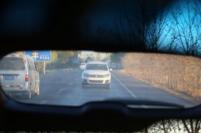
The white Volkswagen Tiguan slipped into the rearview window a few kilometres past the checkpoint, on the blacktop that cuts across the parched eastern stretches of Xinjiang.
The SUV bore no licence plates. But inside were two police officers who, moments before, had questioned me about why I had come as a journalist to this region in China’s distant west. Authorities here continue to expand what they say is an anti-extremism campaign, which has involved locking large numbers of Muslims in centres for political indoctrination and skills training.
Chinese state media declared the effort a success and that the arid landscape was now an oasis of peaceful productivity. I had come to see for myself.
Within minutes of entering Xinjiang, I had to register at a highway checkpoint, one in a dense network of armed sites that ensure locals cannot move far without official permission, giving the region the air of an occupied military zone.
An officer in riot gear, noting my journalist visa, demanded to know where I was going before calling ahead to ensure others were alerted to my presence. As he spoke, a rifle lay on his desk, pointed at my chest.
It was the first sign this reporting trip would be unlike any I’ve done, offering a glimpse of the surveillance and control regime that has made Xinjiang among the world’s more authoritarian places.
READ THE FULL ARTICLE AT THE GLOBE AND MAIL
